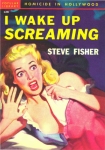 So recently Kristan Higgins blogged about a conference she attended representing a diverse group of writers: romance writers, poets, memoirists, other novelists. At one session, novelist Andre Dubus III made some slighting comments about typical romance readers. When one of the romance novelists took him to task during the Q&A (he’d never read a romance novel—surprise, surprise), he said he’d been put off “those cheesy covers with Fabio.”
So recently Kristan Higgins blogged about a conference she attended representing a diverse group of writers: romance writers, poets, memoirists, other novelists. At one session, novelist Andre Dubus III made some slighting comments about typical romance readers. When one of the romance novelists took him to task during the Q&A (he’d never read a romance novel—surprise, surprise), he said he’d been put off “those cheesy covers with Fabio.”
Now you might simply dismiss that statement as an indication of Dubus’s ignorance regarding romance publishing (Fabio hasn’t been on a cover for a good many years), if these Fabio references weren’t so ubiquitous. John Havel, the blogger who stole a romance writer’s work for his own purposes, justified himself with a reference to “cheesy paperbacks with Fabio on the cover at the grocery store”. Femsplain, a feminist website, wrote a snarky putdown of romance with the comment, “Anything with Fabio on the cover never mentions supporting local farmers and makers.” The Gloss headlined an article about makeup ads with “The Cheesy Ads For MAC’s New Collection Beat Out Any Fabio Romance Novel Cover.” References to Fabio seem to crop up whenever bloggers want to sneer at romance.
Many of these writers seem to be under the impression that all romance novels feature Fabio or a Fabio look-alike. But as Kelly Faircloth points out, Fabio wasn’t even on that many romance covers during his heyday in the eighties and nineties. And he’s not on a single cover being published today. And yet every time another “romance is dumb” article appears, you can be assured there’ll be a reference to Fabio somewhere in the text.
So the question is: what exactly does Fabio represent that gets these people so worked up? Any answer to that question is purely speculative. But considering how eager romance critics are to speculate about the nature of romance readers and writers, I’m perfectly willing to speculate right back.
 For some people, of course, lurid romance novel covers from the eighties and nineties are easy targets, ways of deriding the genre for being “cheesy” (the favorite descriptor). But these same people would never criticize detective novels for the lurid covers that were common during the forties and fifties. I assume that’s because they’re aware that those covers are long gone. But not having bothered to check current romance covers (because why bother—they’re all the same), these same critics demonstrate a woeful ignorance of the subject they’re supposed to be analyzing.
For some people, of course, lurid romance novel covers from the eighties and nineties are easy targets, ways of deriding the genre for being “cheesy” (the favorite descriptor). But these same people would never criticize detective novels for the lurid covers that were common during the forties and fifties. I assume that’s because they’re aware that those covers are long gone. But not having bothered to check current romance covers (because why bother—they’re all the same), these same critics demonstrate a woeful ignorance of the subject they’re supposed to be analyzing.
In terms of Fabio, most of his covers were for historical novels, featuring period outfits and settings. It’s decidedly easier to see historicals as fantasy than, say, thrillers. And of course Fabio, with his shoulder-length hair and gleaming pecs, fit into this fantasy easily. He was an appropriate subject for imaginary romance, sort of like Jamie Fraser (Sam Heughan) is today.
 But the fantasy aspect of romance is one of the many things that romance critics find troubling. In their formulation, women romance readers use fantasy to escape from the reality that they should be facing—husband, home, and, well, ordinary sex. For these critics, romance creates unrealistic expectations. If women think Fabio is what they should want, they’re not going to be happy with their non-Fabio hubbies. Fabio is therefore responsible for women not appreciating the guy drinking a PBR in the recliner.
But the fantasy aspect of romance is one of the many things that romance critics find troubling. In their formulation, women romance readers use fantasy to escape from the reality that they should be facing—husband, home, and, well, ordinary sex. For these critics, romance creates unrealistic expectations. If women think Fabio is what they should want, they’re not going to be happy with their non-Fabio hubbies. Fabio is therefore responsible for women not appreciating the guy drinking a PBR in the recliner.
There are all kinds of problems with this claim (among them the idea that only women romance readers among readers of pop fiction have trouble separating fantasy and reality—male readers of thrillers are supposedly grounded), but to me there’s also a faint whiff of envy. In his prime, Fabio was one good-looking guy. Thus if you’re a man who’s already nervous about his partner’s “unrealistic expectations,” Fabio could become everything that scares you. And if you believe that women who read romances become automatically dissatisfied with real sex, then Fabio could symbolize your panic. Thus you deride Fabio and romance in general because he represents something you don’t really want to admit about yourself.
Now I’m not saying that people who criticize romance are actually victims of sexual panic. Well, actually, yeah, that is what I’m saying. That is, of course, a sweeping generalization based on fragmentary knowledge at best. Sort of like the kind of criticisms aimed at romance by people who have never read it. Go, Fabio, go.
